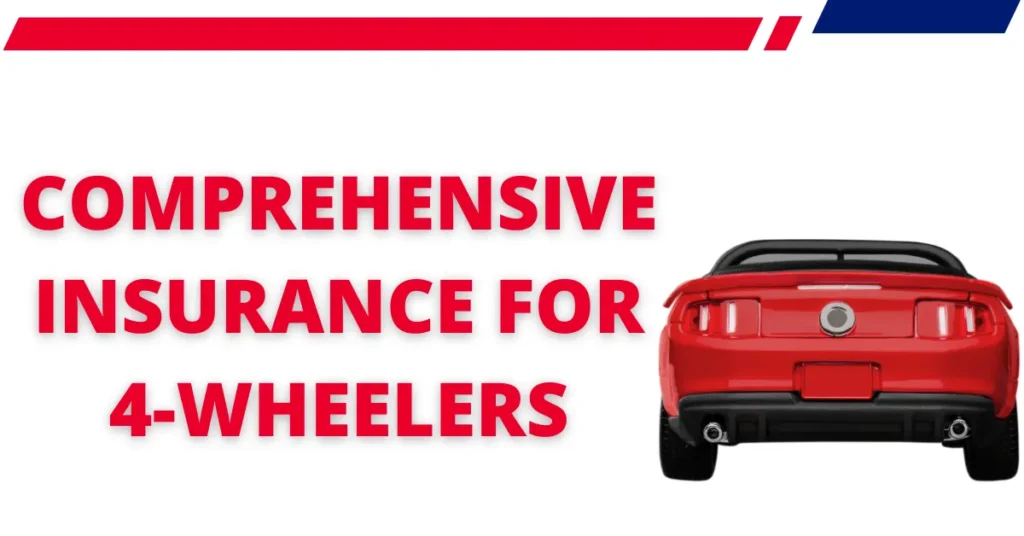Comprehensive insurance for 4-wheelers is a vital part of vehicle ownership, offering extensive protection against various risks and ensuring peace of mind.
Owning a car comes with its share of responsibilities, one of the most important being securing the right insurance.
This guide will walk you through what comprehensive car insurance is, its benefits, and how to choose the right policy.
Comprehensive Insurance for 4-wheelers
Comprehensive car insurance is a type of auto insurance that covers damage to your vehicle from non-collision-related incidents.

This means it protects against a wide array of risks, including theft, vandalism, natural disasters, fire, and more.
Unlike third-party insurance, which only covers damages to others involved in an accident, comprehensive insurance covers your own vehicle as well.
Benefits of Comprehensive Car Insurance
- Extensive Coverage: Protects against a variety of risks beyond just accidents, including natural disasters, theft, and vandalism.
- Financial Security: Minimizes out-of-pocket expenses for repairs or replacements.
- Peace of Mind: Offers confidence knowing that your vehicle is protected against unforeseen events.
- Added Perks: Many comprehensive policies come with additional benefits like roadside assistance, towing services, and rental car coverage.
Step-by-Step Guide to Purchasing Comprehensive Car Insurance
Recommended Reading
- Finance & Insurance HUB
- How to Purchase Insurance: A Comprehensive Guide
- How to Purchase Health Insurance and Where to Buy It
Step 1: Assess Your Needs
Before purchasing comprehensive car insurance, evaluate your requirements:
- Vehicle Value: Consider the value of your car and the potential cost of repairs or replacement.
- Driving Habits: Assess how often and where you drive. High-risk areas may necessitate more extensive coverage.
- Budget: Determine how much you can afford to spend on insurance premiums.
Step 2: Understand the Coverage
Comprehensive insurance covers a wide range of incidents, including:
- Natural Disasters: Damage from floods, earthquakes, storms, and other natural calamities.
- Theft and Vandalism: Protection against theft, attempted theft, and vandalism.
- Fire and Explosions: Coverage for damages caused by fire or explosions.
- Animal Collisions: Damage resulting from collisions with animals.
- Falling Objects: Protection against damage from falling objects like trees or debris.
Step 3: Research and Compare Providers
To find the best comprehensive insurance policy, research and compare different providers:
- Reputation: Look for insurers with good customer reviews and high ratings from independent agencies.
- Coverage Options: Compare the coverage options and exclusions of different policies.
- Premiums and Deductibles: Evaluate the cost of premiums and the deductibles you’ll need to pay in case of a claim.
- Customer Service: Consider the quality of customer service and claims handling.
Step 4: Get Quotes
Use online tools to get quotes from multiple insurance providers. This will give you a clear idea of the cost and coverage options available.
Step 5: Consult with an Insurance Agent
If you’re unsure about any aspect of the policies, consult with an insurance agent. They can provide personalized advice and help you understand the fine print.
Step 6: Purchase Your Policy
Once you’ve selected the best policy for your needs, you can purchase your insurance:
- Application: Fill out the insurance application accurately.
- Payment: Make the initial payment to activate your coverage.
- Policy Review: Review the policy documents carefully to ensure all details are correct.
Step 7: Regularly Review and Update Your Policy
Your insurance needs may change over time. Regularly review your policy and update your coverage as needed to ensure it still meets your requirements.
Conclusion
Comprehensive car insurance is an essential investment for any vehicle owner, providing extensive protection against a variety of risks.
By understanding your needs, researching providers, and carefully selecting your coverage, you can ensure that your 4-wheeler is well-protected.
With the right policy, you can drive with confidence, knowing that you’re prepared for any eventuality.
Call to Action
If you have any questions or need further assistance in choosing the right comprehensive car insurance, feel free to reach out to a trusted insurance advisor.
Protect your vehicle and your peace of mind by securing comprehensive coverage today!